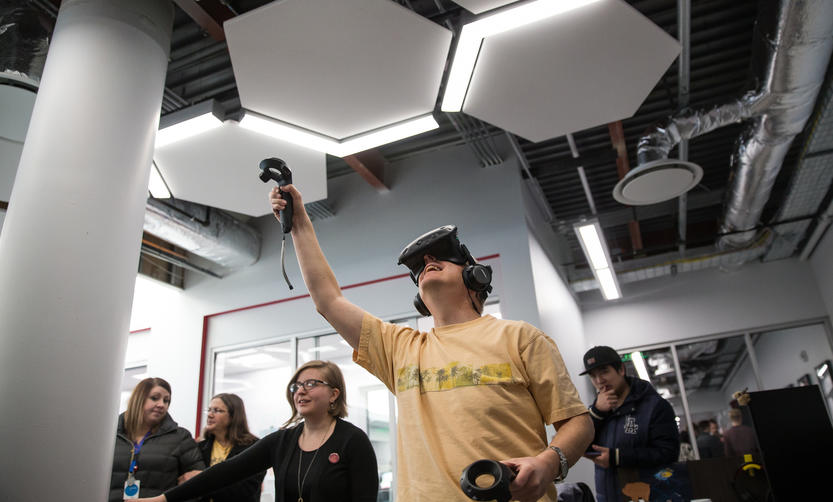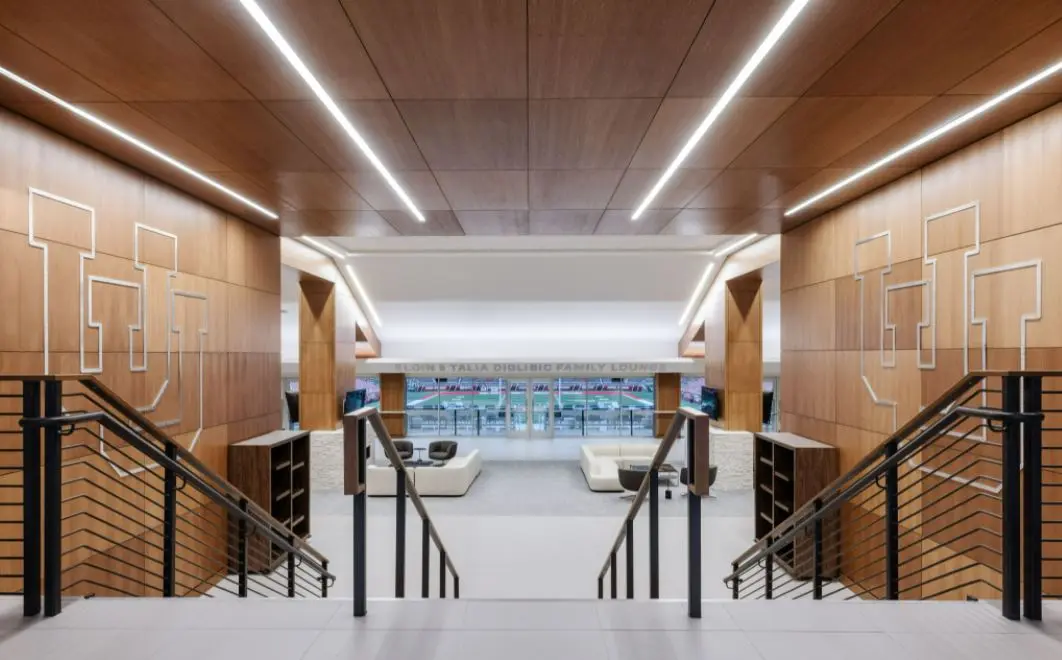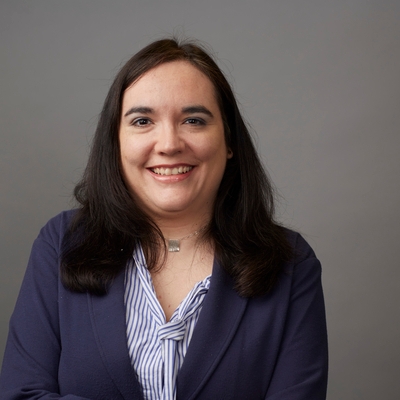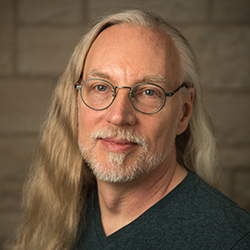
February 4th through 6th, 2024
University of Utah Campus, Salt Lake City, UT
The First Utah Winter Summit on Games, a three-day initiative nestled in the breathtaking heart of the American Intermountain West, will be held February 4th through 6th at the University of Utah in Salt Lake City. The summit's two and a half day working session will bring together leading game scholars from around the world to collaborate with Division of Games faculty to define a new model for an academic unit intrinsically for and about the discipline of Games.
On September 27th of 2023, University of Utah President Taylor Randall announced a significant commitment to the growth of the Games discipline at Utah—an investment of $25 million to support our expansion from the teaching-focused Entertainment Arts and Engineering (EAE) program to the newly created the Division of Games. This transition is intended to greatly expand Utah Games' mission by building new capacity for intrinsic Games research and scholarship in addition to EAE's historic record of success as games educators. In the words of University of Utah Provost Mitzi Montoya:
Its new mission includes its old mission – to be a world leader in games education in higher education. But it also includes a new charge – to lead the progress in research and scholarship around games, to create a deeper understanding of games, and to apply that knowledge in teaching and research to change the lives of players for the better.
This institutional commitment is unprecedented in both character and magnitude. The investment holds the potential to catalyze groundbreaking creative work and scholarship at Utah that pushes the boundaries of what is possible in our Games discipline. The summit will bring together leading scholars in the field to share expertise and insights so that Utah Games may chart this course in a transformative and responsible manner.

The Summit will be held on the University of Utah campus, nestled in the shadow of the majestic Wasatch Mountains. As attendees engage in collaborative discussions in the warm confines of our conference centers set against the backdrop of snow-capped peaks and expansive canyons, they will experience the unique synergy that occurs when scholarly pursuits are paired with unparalleled landscapes. During their time here, attendees can also immerse themselves in a number of planned events and social activities that will be held across campus, throughout the picturesque Salt Lake Valley, and the nearby historic mountain town of Park City, which hosts the Sundance Film Festival every January.
The primary objective of the summit is to formulate direct judgements of quality, effectiveness, and potential impact over the planned direction of Utah Games, and its potential reverberations to the broader Games discipline. This includes assessing (1) what Games scholarship will look like at the University of Utah and beyond; (2) current and future curricular designs for the discipline, both within and outside Utah Games; (3) infrastructure needs to support planned initiatives; and (4) our responsibility to the State of Utah, the Nation, and the World via community, institutional, industrial, and governmental partnerships.
The Summit will provide an excellent opportunity for collaboration and knowledge exchange among Games scholars of national and international reputation. All confirmed attendees are welcome to submit optional position papers, panel proposals, and presentations that speak to diverse aspects of our disciplinary identity, including but not limited to our diverse knowledges, ways of knowing, goals, identities, relationships to stakeholders, responsibilities to our constituents, and more. Contributions will be edited into a proceedings document to be published collectively as a Utah Games Technical Report. We envision a highly creative and stimulating environment. Our hope is that new ideas and innovative perspectives can flourish in a way that scholars can continue to refine beyond the summit.
Summit Schedule
The schedule during the three days of the summit is still being set. Please consider the schedule here tentative until this note is removed.
February 4 - February 7, 2024
| Time | Topic | Presenter |
| Sunday, February 4 | ||
| Welcome Dinner
Bombay Room, Hotel Monaco |
||
| 6:00 - 6:30 | Welcome and Arrival | |
| 6:30 | Opening Remarks | R. Michael Young, Professor and Chair, Division of Games
Rogelio Cardona-Rivera, Assistant Professor, Division of Games |
| 6:30 - 7:30 | Dinner | |
| 7:30 - 9:00 | Introductions and Activity | R. Michael Young, Professor and Chair, Division of Games
Rogelio Cardona-Rivera, Assistant Professor, Division of Games |
| Monday, February 5 | ||
| 8:00 - 8:05
Board bus, Hotel Monaco, East Entrance |
||
| Day 1: 2024 Utah Winter Summit on Games
Boyer and Sorenson Rooms, Alumni House, University of Utah Wifi network: UGuest Password: Follow steps to enter a cell phone number to text a code |
||
| 8:15 - 9:00 | Check-in and Breakfast | |
| 9:00 - 9:25 | Welcome, Introduction to Goals and Activities for the Day | R. Michael Young, Professor and Chair, Division of Games
Rogelio Cardona-Rivera, Assistant Professor, Division of Games |
| THEME 1: The Opportunity | ||
| 9:25 - 9:35 | The History of Utah Games | R. Michael Young, Professor and Chair, Division of Games |
| 9:35 - 9:50 | Existing Degrees: The BS in Games, the Masters of Entertainment Arts and Engineering | Ryan Bown, Associate Professor, Lecturer, Division of Games
Corrinne Lewis, Assistant Professor, Lecturer, Division of Games |
| 9:50 - 10:00 | Thoughts on a PhD Degree in Games | Rogelio Cardona-Rivera, Assistant Professor, Division of Games |
| 10:00 - 10:30 | The Potential for Increased Inclusion In and Through Games Research | Myra Washington, Assistant Vice President for Faculty Equity and Diversity
Ashley Guajaro, Associate Professor, Lecturer, Division of Games |
| THEME 2: Lessons So Far | ||
| 10:30 - 11:45 | Big Picture Talks on Games as a Discipline | Utah Winter Summit on Games participants |
| 11:45 - 12:00 | The Challenge: Framing for the Afternoon | Rogelio Cardona-Rivera, Assistant Professor, Division of Games |
| 12:00 - 1:00 | Lunch and Activity | |
| Afternoon Activities
Alumni House Front Entrance |
||
| 1:15 - 1:30 | Depart for afternoon activities | |
| 1:15 - 5:00 | Scheduled afternoon activities
Please refer to the Monday Afternoon Activities document for details. |
|
| 5:15 | Return to Hotel Monaco | |
| 5:15 - 6:45 | Personal time | |
| Dinner
Red Iguana 2 |
||
| 6:50 | Bus departs Hotel Monaco, East Entrance | |
| 7:00 - 8:30 | Dinner at Red Iguana 2 | |
| 8:30 | Bus departs Red Iguana 2 | |
| Tuesday, February 6 | ||
| 8:00 - 8:05
Board bus, Hotel Monaco, East Entrance |
||
| Day 2: 2024 Utah Winter Summit on Games
Ken Garff Scholarship Club, S-Level, Rice-Eccles Stadium, University of Utah Wifi network: Ken Garff University Club Password: GoUtes422! |
||
| 8:15 - 9:00 | Breakfast | |
| 9:00 - 9:25 | Welcome Day 2 | R. Michael Young, Professor and Chair, Division of Games
Rogelio Cardona-Rivera, Assistant Professor, Division of Games |
| 9:25 - 9:35 | Message from the Dean | Arnab Chakraborty, Dean, College of Architecture and Planning |
| 9:35 - 9:50 | Setting the Stage for Our Potential | R. Michael Young, Professor and Chair, Division of Games
Rogelio Cardona-Rivera, Assistant Professor, Division of Games |
| TOUR: Master Game Studio: Alt Control and Advanced Projects | ||
| 9:50 - 10:00 | The Master Games Studio | R. Michael Young, Professor and Chair, Division of Games
Rogelio Cardona-Rivera, Assistant Professor, Division of Games |
| 10:00 | Walk to Building 72 (Utah Games) | |
| 10:15 - 11:15 | Meet the Master Games Studio | Hosted by Master Games Studio Faculty Members:
|
| 11:20 - 11:30 | Walk back to Ken Garff Scholarship Club | |
| 11:30 - 12:30 | Lunch | |
| THEME 3: Retention, Promotion, and Tenure: Valuing Excellence in Many Forms | ||
| 12:30 - 12:40 | Breakout 1 Prompt and Instructions | Rogelio Cardona-Rivera, Assistant Professor, Division of Games |
| 12:40 - 1:10 | Breakout Session 1A
Rooms S104-S107 |
|
| 1:10 - 1:15 | Socially sanctioned switch | |
| 1:15 - 1:45 | Breakout Session 1B
Rooms S104-S107 |
|
| 1:45 - 1:50 | Return to main room | |
| 1:50 - 2:20 | Report and Discussion 1 | Breakout Groups |
| 2:20 - 2:35 | Networking Break 1 | |
| THEME 4: Setting a Culture of Transdisciplinary Excellence | ||
| 2:35 - 2:45 | Breakout 2 Prompt and Instructions | Rogelio Cardona-Rivera, Assistant Professor, Division of Games |
| 2:45 - 3:15 | Breakout Session 2A
Rooms S104-S107 |
|
| 3:15 - 3:20 | Socially sanctioned switch | |
| 3:20 - 3:50 | Breakout Session 2B
Rooms S104-S107 |
|
| 3:50 - 3:55 | Return to main room | |
| 3:55 - 4:25 | Report and Discussion 2 | Breakout Groups |
| 4:25 - 4:45 | Networking Break 2 | |
| 4:45 - 5:00 | Closing Remarks & Next Steps | R. Michael Young, Professor and Chair, Division of Games
Rogelio Cardona-Rivera, Assistant Professor, Division of Games |
| 5:00 - 5:45 | Break | |
| Evening Reception
Ken Garff Scholarship Club, S-Level, Rice-Eccles Stadium, University of Utah |
||
| 5:45 - 8:00 | The 2024 Utah Winter Summit on Games Reception | |
| 6:00 - 6:15 | Remarks from the Provost and Sr. Vice President of Academic Affairs | Mitzi Montoya, Provost and Sr. Vice President for Academic Affairs, University of Utah |
| 8:00 | Bus departs to Hotel Monaco | |
| Wednesday, February 7 | ||
| Depart Salt Lake City |
Venues and Travel


The Summit's Hotel: Hotel Monaco

Transportation
Air travel will also be booked through the Division of Games. Attendees arriving by plane will fly in to Salt Lake City International Airport (SLC), one of the most highly traveled and most efficient airports in the nation. It ranks first in the U.S. as far as on-time departures and arrivals – and fewest flight cancellations. It is also only minutes from the University of Utah.
Individual travel to and from the airport and the Hotel Monaco on day of arrival/departure is best conducted using a self-booked rideshare service. All other transportation between summit venues will be provided by the organizers.
Meals
Summit attendees will have meals provided, including dinner Sunday night, breakfast, lunch and dinner Monday, and breakfast, lunch and dinner Tuesday. Attendees should plan on making their own breakfast plans on Wednesday (day of departure). There are a number of breakfast restaurants within walking distance of the summit hotel, including the hotel's own, highly rated restaurant, Bombara. Please let the organizers know of any dietary requirements you may have.
Altitude, Humidity, and Temperature
Utah's license plate slogan reads "Life, Elevated," and this is no exaggeration. The Salt Lake valley is 4,265 feet above sea level. Nearby Park City, where some attendees may visit, is 6,936 feet above sea level. For visitors from lower climes, the change in altitude can come with potential altitude sickness caused by the moderate decrease in the oxygen level in the air. Although uncommon, symptoms may include headaches and tiredness, so please be mindful of these changes, especially your first day here. The best way to avoid these symptoms is to moderate your activity for a day, stay hydrated, and get a good night's sleep.
The average relative humidity in Salt Lake during February is 64%, which may also be a change for travelers used to more humid home environments. Your hotel can provide a humidifier at your request (if one is not already in your hotel room closet) that you can run overnight in your room. Please be sure to hydrate well during your visit.
The average daily high in Salt Lake City in February is 45 degrees Fahrenheit, and the average low is 31 degrees. For attendees planning a visit to Park City, the average high is 37 degrees and the average low is 15 degrees. Please be sure to pack accordingly.
ADA Accommodation
Individuals requesting ADA accommodation should communicate their needs with summit organizers, who will work with hotel and venue provides to provide support.Summit Participants
| Rodrigo Canaan | Rodrigo Canaan is an assistant professor of Computer Science and Software Engineering at Cal Poly. He received his Ph.D. in Computer Science from New York University in 2021. His research is at the intersection between games and artificial intelligence, and in building systems that can cooperate with humans on a variety of tasks. Some of his topics of interest are cooperative games, co-creativity and emergent behavior, as well as the social and ethical implications of artificial intelligence to society. He is also one of the organizers of the Generative Design in Minecraft Competition (GDMC), which has been running since 2018. |  |
| Marc Christie | My research interest focuses on smart tools to assist the creation of complex 3D contents by mixing Computer Graphics and Artificial Intelligence techniques. I am currently working on automated and assistive camera control techniques for interactive environments. More precisely:
|
 |
| Mike Cook | I'm Mike Cook, an AI researcher and game designer. I am currently a Senior Lecturer in the Department of Informatics at King's College London, where I also hold a Royal Academy of Engineering Research Fellowship. I do research at the intersection of artificial intelligence, creativity and game design. I'm the creator of Puck and ANGELINA, AI game designers; the founder of PROCJAM, the Procedural Generation Jam; and an author of the MIT Press book Twitterbots. I also regularly design games and other weird digital experiences. |  |
| Clara Fernández-Vara | Clara Fernández-Vara is a media scholar, and a game designer and writer. Her work focuses on narrative design, both as her professional practice and in her academic work, as well as videogame history. Clara’s videogame work is grounded in the humanities, informed by her background in literature, film and theatre, which she brings to digital technologies. Before joining the NYU Game Center, Clara spent six years at the Massachusetts Institute of Technology as a researcher and game developer. She holds a Ph.D. in Digital Media from the Georgia Institute of Technology and a Masters in Comparative Media Studies from MIT. Clara has presented her work at various international academic and industry conferences, such as DiGRA (Digital Games Research Association), Foundations of Digital Games, the Electronic Literature Organization Conference, Replaying Japan, Game Developer’s Conference (GDC), and East Coast Games Conference. Her book, Introduction to Game Analysis, is now on its third edition. In addition to her academic work has worked on commercial games for Warner Bros., the Spanish National Ballet, and Big Fish Games among others. Her latest game release was Saltsea Chronicles, with Die Gute Fabrik. |  |
| Guo Freeman | Guo Freeman is a Dean’s Associate Professor in Human-Centered Computing whose research is situated at the unique intersection of social computing, social VR, and entertainment computing. At Clemson, she directs the Gaming and Mediated Experience Lab (CUGAME). Her work brings a unique combination of profound theoretical foundation, nuanced empirical perspectives, especially in-depth qualitative insights, and participatory technology design and prototype to investigate how interactive technologies such as multiplayer online games, esports, live streaming, social VR, social media, and Artificial Intelligence (AI) shape interpersonal relationships and group behavior. She has authored over 90 peer-reviewed publications and won 13 Best Paper Honorable Mentions Awards (top 3%-5%) at ACM SIGCHI venues. She has secured $20.4 million in external grant funding from the National Science Foundation (NSF), US Army, and the Air Force Office of Scientific Research. Her research is also uniquely driven by her focus on marginalized technology users due to their gender, race, sexuality, age, and disability, including women, LGBTQ individuals, ethnic minorities, minors, and persons with disabilities. She especially dedicates to broadening women’s and minorities’ participation in computing and was a Grace Hopper Women in Computing Faculty Mentor. |  |
| Kishonna Gray | Dr. Kishonna L. Gray (@kishonnagray) is an Associate Professor in Writing, Rhetoric, & Digital Studies and Africana Studies at the University of Kentucky. She is an interdisciplinary, intersectional, digital media scholar whose areas of research include identity, performance and online environments, embodied deviance, cultural production, video games, and Black Cyberfeminism. Dr. Gray is the author of Intersectional Tech: Black Users in Digital Gaming (LSU Press, 2020). She is also the author of Race, Gender, & Deviance in Xbox Live (Routledge, 2014), and the co-editor of two volumes on culture and gaming: Feminism in Play (Palgrave-Macmillan, 2018) and Woke Gaming (University of Washington Press, 2018). Dr. Gray has published in a variety of outlets across disciplines and has also featured in public outlets such as The Guardian, The Telegraph, and The New York Times. |  |
| Aleshia Hayes | Dr. Aleshia Hayes is an Assistant Professor in University of North Texas’ College of Information in the Department of Learning Technologies. Dr. Hayes is passionate about developing, evaluating, and iterating on technology used for learning in formal and informal environments. Previously Dr. Aleshia Hayes was founding Director of SURGE (Simulation Research and Game Experience) VR lab at Purdue University in Fort Wayne where she led design, development, testing and implementation of Virtual Reality, Augmented Reality, Mixed Reality, Serious Games and gamified Learning Technology tools for commercial and military partners. In addition to a passion for the effective implementation of emerging technology for learning, Dr. Hayes works tirelessly to encourage students at all levels to pursue STEM education and STEM careers with the explicit goal of expanding and diversifying STEM education and the STEM workforce. Her efforts to recruit students into STEM range from public exhibits of Virtual Reality, to K12 classroom visits, to app development camps for middle and high school aged students to hosting interdisciplinary game development events. Dr. Hayes leverages her research funded by NSF, NIH, the Department of Defense and the Bill and Melinda Gates Foundation to inform Learning Technology design and implementation across learners from K12 and university levels to the workforce. |  |
| Ian Horswill | My work lies roughly within the areas of artificial intelligence and interactive art and entertainment. My AI research focuses on control systems for autonomous agents: how does an agent decide from moment to moment what to do, based on an ongoing stream of sensor data and a continually varying set of goals and entanglements with the world. My past work focused on robotics and computer vision, but my more recent work centers around the the modeling and simulation of emotion, personality, and social behavior for virtual characters for games and interactive narrative. Interactive narrative is particularly interesting for AI because it provides a natural domain in which to examine aspects of human personality and behavior that one would not want to duplicate in service robots, such as aggression and depresssion. Within interactive art and entertainment, I'm interested in exploring alternative genres and interaction modes that can expand the medium. Interactive narrative is particularly interesting because it offers the promise of an aesthetics that emphasizes experiences of identification, empathy, and affiliation, over mastery, frustration, and control. However, making a piece that provides those experiences in practice is a difficult task that involves a number of interesting research problems in computer science and cognitive science. |  |
| David C. Jeong | David Jeong is an Assistant Professor in the Department of Communication at Santa Clara University. His research areas include the study of VR, haptics, and gaming within human-computer interaction, as well as critical approaches to online toxicity within games and social media. At Santa Clara University, he is the Director of the Imaginarium VR Lab, which specializes in game development, XR development, 3D modeling, data visualization, digital humanities, and high performance computing, as well as the SCU Media Lab, which investigates media technologies (social media, AI, games) from both a critical and data-driven perspective. |  |
| Rilla Khaled | I am an academic / designer who is interested in the middle space between academia and design practice. I teach Computation Arts at Concordia University in Tiohtià:ke / Montreal. I direct the TAG Research Centre (when I am not on sabbatical). |  |
| Mitu Khandaker | Mitu Khandaker is a game designer, scholar, and entrepreneur. She holds a PhD on the aesthetics of interactivity in videogames, completed at the University of Portsmouth in 2015. Prior to that, she was a 2008 Kauffman Global Scholar and received a Masters in Computer Engineering from the University of Portsmouth. A rising star in the games industry, she won the Breakthrough Brit BAFTA in 2013 and the Creative English Trailblazer Award in 2014. In 2011 Mitu founded The Tiniest Shark Ltd. – an indie micro-studio for which she provides creative, technical, and operational leadership. The Tiniest Shark released Redshirt in 2013, a satirical simulation game that uses science fiction tropes to explore social dynamics. The game received excellent reviews from sources such as Polygon, PC Gamer, and Paste Magazine. Mitu has been invited to speak at several major conferences and industry events, such as the Game Developers’ Conference, TEDxEastEnd, GamesWest, NineWorlds Conference, and the Royal Academy of Engineering in London. She was a keynote speaker at the 2014 BAFTA Cymru Awards and gave one of the keynotes for the 2015 Global Game Jam. Since 2013, Mitu has served as the STEM/Video Games Ambassador in the UK, where she promotes STEM subjects and game development at schools with a particular interest in advocacy for gender equality in games. |  |
| James M. Malazita | Jim Malazita (Ph.D. Drexel University) is Associate Professor of Science & Technology Studies and the Associate Director of the Games and Simulation Arts and Sciences Program at Rensselaer Polytechnic Institute. He studies the co-production of technological and social elements of games and creative software, with a particular focus on game engines, gender, and race. His current work examines the role of game companies and game engines in shaping the infrastructural and legal standards of the future web. His essays have been published in a variety of venues, including Digital Creativity, Debates in the Digital Humanities, Game Studies, Feminism in Play, and Design Issues, and his work has been funded by the National Endowment for the Humanities, the Strong Museum of Play, and the Red Hat Foundation. His forthcoming book, Enacting Platforms: Feminist Technoscience and the Unreal Engine is to be released by the MIT Press July 2024. |  |
| Lennart Nacke | Professor Lennart Nacke, PhD, is a pioneer in games, gamification, and user experience. As a Professor of Human-Computer Interaction (HCI) in Games at the University of Waterloo, he explores how user experience of video and exercise games can drive engagement and change behaviours. Over the past 15 years, he has published over 200 academic papers and a best-selling book on Games User Research. A sought-after keynote speaker, Dr. Nacke has advised organizations worldwide on effective gamification strategies. He was recognized among the top 10 HCI scholars of the last decade and the top 2% of scientists worldwide. His groundbreaking work continues to shape how we understand and apply games research. |  |
| Daniel Pimentel | I am an Assistant Professor of Immersive Media Psychology in the School of Journalism and Communication at the University of Oregon where I conduct experimental research to understand how unique affordances of cross-reality (XR) platforms - virtual reality, augmented reality, mixed reality - can be leveraged to influence human attitudes and behaviors in the context of various social, health, and environmental issues. I am also on the board of Yellow Wood Immersive, an immersive media studio producing cutting edge XR storytelling projects that focus on social good initiatives. I received my PhD in Mass Communication from the University of Florida and my Masters in Global Strategic Communication from Florida International University. I drink my coffee black, enjoy the occasional marathon, and I consider Final Fantasy the single greatest video game property ever. Period. |  |
| Rabindra (Robby) Ratan | Rabindra (Robby) Ratan (PhD, University of Southern California; MA/BA, Stanford University) is Associate Professor and Director of the SPARTIE Lab at Michigan State University (CV). Dr. Ratan conducts social and psychological research on the effects of human-technology interaction, focusing on how media technologies (e.g., avatars, video games, agents/AI, VR) influence meaningful outcomes (e.g., equity, well-being, motivation) across societal contexts (e.g., education, health, industry). He is particularly interested in the Proteus effect (i.e., avatar characteristics influencing user behaviors), gender stereotypes in gaming, and virtual meetings. He has published over 65 peer-reviewed articles and received over $2M in grant funding, including from the National Science Foundation. Dr. Ratan has also received multiple teaching awards and presently teaches his classes in virtual reality. |  |
| TreaAndrea M. Russworm | TreaAndrea M. Russworm, Ph.D. is the Microsoft Endowed Chair and a Professor in the Interactive Media & Games Division at the University of Southern California. She is also the founder of Radical Play (a games-based public humanities initiative and afterschool program), and she has been a professor and Associate Dean of Diversity, Equity, and Inclusion at UMass Amherst. A prolific author and editor, Russworm is a Series Editor of Power Play: Games, Politics, Culture (Duke University Press). She is the author or editor of three books: Blackness is Burning; Gaming Representation; and Theorizing Tyler Perry. With research expertise in digital culture, video games, and popular African American media, Professor Russworm’s scholarship and interviews have also been shared on CNN, The History Channel, Turner Classic Movies, in podcasts, and on streaming platforms like Twitch. She is a video game Hall of Fame voter, and she is currently writing a new monograph on The Sims and a book on race and the politics of play. |  |
| Adrienne Shaw | Adrienne Shaw is an Associate Professor in Temple University’s Department of Media Studies and Production and a member of the Lew Klein College of Media and Communication graduate faculty. She is also the inaugural director of Temple’s Graduate Certificate in Cultural Analytics and an affiliate member of the Gender, Sexuality, and Women Studies program. Shaw is author of Gaming at the Edge: Sexuality and Gender at the Margins of Gamer Culture (winner of the 2016 International Communication Association’s Popular Communications Division’s Book Award). She has co-edited three anthologies: Queer Game Studies (2017, University of Minnesota Press), Queer Technologies: Affordances, Affect, Ambivalence (2017, Routledge), and Interventions: Communication Research and Practice (2018, Peter Lang), as well as a special issue in the Journal of Communication on Open Research practices (2021, Vol 71 Issue 5). A full list of her publications is available via Google Scholar. In 2021 she became a member of GLAAD’s Gaming Advisory Council, and served as a judge for the Gayming Awards since 2021. She is the founder of the LGBTQ Game Archive and co-curator of Rainbow Arcade, the world’s first exhibit of LGBTQ game history (Dec 2018-May 2019 in Berlin, Germany). From 2011 to 2015 she was also part of the multi-million dollar and award winning CYCLES project, which developed games to train users to identify and mitigate cognitive biases. |
 |
| Gillian Smith | Gillian Smith, an award-winning game designer, joined WPI in 2017. Her interdisciplinary work merges technical research in AI and HCI with creative practice in textiles and games, with a view towards addressing social issues and broadening participation and perspectives on computing. Their research interests are in computational creativity, game design, computer science education, and the intersection of traditional crafts and computation. |  |
| Anne Sullivan | Dr. Anne Sullivan is an Assistant Professor in Digital Media and head of the StoryCraft Lab at Georgia Tech. She received her PhD in Computer Science from University of California, Santa Cruz, where she created an artificial intelligence framework to support playable stories - stories that adapted and changed based on player choice. Before returning to school for her PhD, she was a game developer and designer with experience at AAA studios and as an independent developer. Her research focuses on playful and storied interactive experiences from a feminist and humanistic perspective, with an emphasis on human-centered artificial intelligence (AI). To that end, Dr. Sullivan has established herself in the fields of critical game analysis through her work in feminist analysis of games, and co-creative AI through her work in educational interactive experiences and AI-assisted tools for craft and narratives. She also studies craft as an analog counterpart to playful and storied interactive experiences, researching in the exciting and emerging field of computational craft. Dr. Sullivan is an award-winning quilter and the concept designer and producer of Loominary – a digital game system controlled with a loom - which has been shown internationally, including at the SAAM Arcade exhibit at the Smithsonian American Art Museum. |
 |
Organizers
| Rogelio Cardona-Rivera | Rogelio is an Assistant Professor and Founding Faculty of the Division of Games, and Adjunct Assistant Professor in the Kahlert School of Computing and the Department of Psychology at the University of Utah. He directs the Laboratory for Quantitative Experience Design. His research focuses on the design of games, systems where users direct an unfolding experience by taking on ludic/dramatic roles. Broadly speaking, he argues that the process of design requires computationally modeling our human intelligence: our unique capacity to interpret and understand the world around us. His work involves synthesizing, designing, developing, and experimentally evaluating intelligent artifacts that codify aspects of how we imagine ourselves acting within virtual environments. |  |
| Kurt Guner | Kurt Güner has worked or studied at the University of Utah since 2014, completing his Doctorate in History in 2019. He has experience training and supporting faculty with the Center for Teaching Excellence, helping stopped-out students finish their degrees with the Return to the U Program, and helped found and manage Salt Lake Community College’s Prison Education Program. Currently managing the staff of the Division of Games, Kurt is excited to help the Division grow and meet its potential. |  |
| Cami Sheridan | Cami Sheridan joined the University of Utah in 2019 and accepted the role of Office Manager for Utah Games in 2022. She holds a Bachelor of Science in Theatre Arts from Southern Utah University and is pursuing her Master of Arts in Community and Organizational Leadership at Westminster University. Over the past four years at the U, she has played a crucial role in coordinating over a dozen of significant events on campus, including one that attracted over 5,000 prospective students to the university's campus. |  |
| Lisa Winter | Lisa Winter has been a part of the University of Utah community since 2006. Over the years, she has gained a wealth of experiences across campus, and achieved her PMP certification in 2021. As a senior IT project manager, she supports the Utah Division of Games and the Utah Data Coordinating Center to which she brings almost ten years of project management experience. She oversees the day-to-day progress, schedule, risks, and status for multiple projects for the Division concurrently. |  |
| R. Michael Young | Michael Young is Professor and Chair of the Division of Games at the University of Utah in Salt Lake City, UT, where he is also an Adjunct Professor in the School of Computing and an Adjunct Professor in the Department of Philosophy. At the U, he directs the Liquid Narrative research group, where he works to develop computational models of interactive narrative with applications to computer games, educational and training systems and virtual environments. |  |
This page contains links and resources relevant to the central questions that will be addressed at the summit. Participants who would like to contribute to content on this page should email the details to the summit organizers.
2024 Utah Game Summit Sponsors Include


